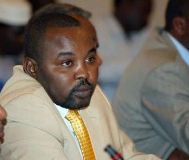UN plans for peace in Darfur will fail – rebel leader
By Karl Maier
September 5, 2007 (PARIS) — Sudanese rebel leader Abdel Wahid Nur said current United Nations plans to end the four-year conflict in the western region of Darfur are doomed to fail.
 Nur, 39, said he won’t join peace negotiations between the government and the insurgents the UN is planning to sponsor this year until the authorities in Khartoum halt attacks on civilians and disarm their militia allies, known as the Janjaweed.
Nur, 39, said he won’t join peace negotiations between the government and the insurgents the UN is planning to sponsor this year until the authorities in Khartoum halt attacks on civilians and disarm their militia allies, known as the Janjaweed.
“I am very sure that unfortunately this process is going to complicate and increase the suffering of our people,” Nur said yesterday in an interview. “I am here with you today in Paris, while my people are being killed, raped and terrorized.”
UN Secretary-General Ban Ki-moon, on a weeklong visit to Sudan, Chad and Libya, is scheduled to travel to Darfur today after calling for an immediate cease-fire and peace talks between the government and the rebels. The UN and the African Union are planning to deploy a 26,000-member peacekeeping force this year to halt a war that has killed 200,000 people.
“The AU and the UN want to put me in a position that I am an obstacle to peace,” he said. “We want peace first, we want security” before negotiations start.
Nur boycotted talks to unify Darfur’s rebel factions in Arusha, Tanzania, last month organized by the UN and the African Union and said that many of the faction leaders who attended are interested in jobs and “peace for themselves.”
A founding member and first president of the rebel Sudan Liberation Movement in 2002, Nur has been living in exile in Paris since he left Eritrea in 2006. When asked when he may return to Darfur, he rolled up his left shirt sleeve and exposed the right side of his chest to show scars of bullet wounds.
REFUGEE CAMPS
He remains popular in the Darfur refugee camps that house about 2 million people and said he’s in daily contact with camp leaders. His decision not to sign a peace agreement with the government last year, even though he was prodded by Western diplomats such as former U.S. Deputy Secretary of State Robert Zoellick, led to the accord’s collapse.
Nur rejected that agreement, signed by his rival in the SLM, Minni Minnawi, arguing that it did not provide enough guarantees for disarmament of the Janjaweed militia, compensation for the victims of war and political representation for Darfurians.
“He believes he retains support as a rejectionist, and given how poorly the negotiations have unfolded, he is right,” John Prendergast, an analyst at the Brussels-based International Crisis Group, said in an e-mailed response to questions. “It will be very hard to get him back into a negotiations process.”
PEACE TALKS
President Umar al-Bashir’s government says it is ready to start peace talks with the rebels. Ban said the government told him it will allow the SLM’s humanitarian aid coordinator, Suleiman Jamous, to leave a UN hospital in central Sudan and travel to Kenya for medical treatment.
Some analysts say Nur’s opposition to the new UN plans for peace talks shows he is losing relevance and may threaten his popularity.
“His people are pressing him to get moving quickly and join the peace talks before he is sidelined,” former African Union adviser Alex de Waal, co-author of “Darfur: A Short History of a Long War,” said in an e-mailed response to questions.
The conflict in Darfur started in February 2003 when the SLM, demanding a greater share of Sudan’s political power and oil revenue, began attacking government forces.
The authorities in Khartoum responded by dispatching troops and arming militias to attack villages of Darfur’s main African tribes, the Massaleit, Zaghawa, and Nur’s own Fur people.
ARAB SETTLERS
Nur says that in recent months the government has brought in Arabs from neighboring countries such as Chad and Niger to settle in areas vacated by civilians fleeing the violence.
“The government wants to create a new demography in Darfur, he says. “It is 100-plus one percent genocide, massive killing, massive rape against civilians, massive burning of villages.”
Nur professed hope that the international community will help to end the Darfur conflict, and said it needed to act as it did in Kosovo when it forcibly halted fighting before starting peace negotiations.
“If humanity has no borders, if humanity has no white and black, it is time for the international community to act like that,” he said.
He also said he was confident that Darfur’s Arab and African populations could one day live in peace.
“Some of them will never forget this, someone who has had his wife or mother killed, so it won’t happen overnight,” he said. “Without reconciliation there won’t even be Darfur.”
While Nur aspires to become president of Sudan one day, he ruled out participating in 2009 parliamentary and presidential elections because he says they won’t be free and fair.
His ultimate aim is the downfall of the Bashir government.
“This is our final goal, because there is no Sudan if this regime is in power,” he said.
(Bloomberg)
